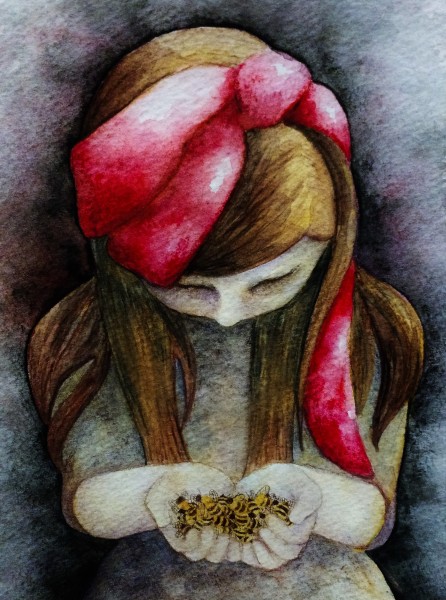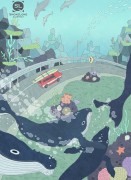The beekeeper’s zombie-daughter wears a single red ribbon in her hair. He cooks a meal and she stands in the window blank-staring. Her fingers trace on the window, but she can’t know to draw, to make shapes with her hands. He traces her fingers, follows her movements. He cries, and she only stares, fingers circling and swirling.
He walks to the river to see if there are fish today. The zombie daughter stands on the hillside, stumbles toward and past him, into the water, and she emerges on the other side and walks toward a mutated deer, her dress dripping with mud. He watches her go and does not go after her. She doesn’t know him, and he wishes he could be unburdened with his knowing.
Zombies all around go about their undying. There are thousands and they chomp their eager jaws. In the darkest times, the beekeeper wishes the zombies would act on some hunger. He imagines them tearing his flesh and splitting him to be nourished. He imagines going to his daughter and offering his body in order that she might live.
The beekeeper pushes through their fog. He returns home, checks on the bees, makes note of the number, sweeps the new dead onto the earth, and stomps them into the ground. She returns. The beekeeper caresses a towel across his zombie daughter’s neck to remove the mud, but he tears at her skin and the beekeeper lets go. The zombie daughter kneels, gathers the bodies of bees, and holds them up, a bouquet.
“I wish you didn’t remind me so much of me,” he says.
The bees keep dropping. The beekeeper sweeps more bodies away. He curses what ailment is killing them. A helicopter flies overhead. Searching out survivors, he thinks, and he does not wave, does not let them know he’s alive.
A tide of the zombies pull down a fence. The beekeeper angers, walks to the herd with a shotgun. He wants to dispatch them—he thinks, dispatch. They are not human, cannot be murdered. He raises the gun. To his right, in the middle of the group, she watches, groans. He drops the gun, goes to her, apologizes. He wonders how lonely he’ll be without them.
The beekeeper goes to the patio in the morning and finds the daughter sitting in a rocking chair rocking. The beekeeper goes to the garden in hopes that vegetables are sprouting.
One day, there is a crash. He goes to the hive and there it is broken and fallen to the ground. And, his daughter, standing next to the hive, wearing her guilt as gloves on her hands. The beekeeper grabs her by the shoulders and shakes her. He feels the deadened muscles slip from tendons, the tendons sliding from bone. He yells and the cacophony draws the zombie crowd. They howl and moan with him. But, the beekeeper does not stop this violence. He shakes his daughter, the droning din around him cocooning, and he imagines their noise shattering their bodies into pollen and dust. The wind will carry their particles, covering the earth.



 The SmokeLong Grand Micro Contest (The Mikey) is now an annual competition celebrating and compensating the best micro fiction and nonfiction online.
The SmokeLong Grand Micro Contest (The Mikey) is now an annual competition celebrating and compensating the best micro fiction and nonfiction online.